The Supreme Court has already decided it will address the constitutionality of a federal law barring unlawful users of drugs from possessing firearms this session, but that's not the only part of Section 922(g) that could come under SCOTUS scrutiny this term.
The justices are also slated to consider several cases at their November 21 conference dealing with the statute that forbids anyone convicted of a crime punishable by more than a year in prison from exercising their Second Amendment rights, regardless of whether or not their offense was violent. Melynda Vincent was convicted of writing a bad check almost two decades ago, and in the years since has conquered her drug addiction and become a licensed therapist helping others. Still, the Tenth Circuit Court of Appeals ruled that Vincent, along with everyone else with a similar history, can be denied their right to keep and bear arms without issue.
The Court is also slated to consider an appeal by Steven Duarte, who says that Section 922(g)(1)'s categorical ban on felons possessing firearms, including those convicted of a non-violent felony, is an infringement on his Second Amendment rights. Duarte was convicted of possessing a firearm as a convicted felon based on five earlier non-violent convictions for vandalism, possession of a controlled substance for sale, two counts of evading apeace officer, and one prior conviction for possessing a firearm as a felon.
If the Supreme Court decides to grant cert to Vincent and/or Duarte's cases, that could have an impact on a newly-filed lawsuit in Kentucky. Hubert Ford, who was convicted of felony fraud back in 1997, has stayed on the right side of the law ever since. Under Section 922(g)(1), however, Ford's still ineligible to exercise his Second Amendment rights.
Earlier this year a Kentucky trial court held that the state statute that largely mirrors Section 922(g)(1) was facially unconstitutional on Second Amendment grounds, but a Kentucky Court of Appeals reversed that opinion last month. That's not all that surprising, considering that to succeed on a facial challenge the plaintiff has to show that there is no scenario in which the law is constitutional (as compared to an as applied challenge where the plaintiff has to demonstrate that the law is unconstitutional as it applies specifically to them).
A prohibition for those convicted of violent offenses is on firmer legal footing than a blanket ban on all those convicted of felonies or crimes punishable by more than a year in prison. The Supreme Court indicated in Rahimi that the dangerousness of a defendant matters when it comes to stripping away their Second Amendment rights, and if that same logic is applied to Melynda Vincent, Steven Duarte, or Hubert Ford, there's a strong case that these individuals haven't demonstrated the slightest sign of dangerous behavior in both their underlying offenses or their behavior since their convictions.
Ford's case is likely going to be put on hold if the Supreme Court decides to address Section 922(g)(1) in either the Vincent or Duarte cases. If the justices deny cert to both cases, however, Ford's lawsuit should proceed, and could become another vehicle for the Court to rule on the constitutionality of Section 922(g)(1) in the future.
The DOJ has a few weeks to respond to Ford's complaint, but based on what Solicitor General D. John Sauer has said about Vincent and Duarte its likely that the government's response will tell the district court to keep Ford's prohibition in place and let him apply to the Attorney General to have his rights restored. The DOJ announced a proposed rule earlier this year that would establish a system for prohibited persons to submit a request for relief to the AG's office, but that rule has not yet gone into effect.
My hope is that the justices will address this issue sooner rather than later, and in my opinion Melynda Vincent provides a very compelling case for the Court. I'd hate to see her prohibition stand, but SCOTUS does deny her petition there's some small comfort in knowing that there are other cases, like Ford's, in the legal pipeline that the Court could take up in the not-too-distant future.
Editor’s Note: After more than 40 days of screwing Americans, a few Dems have finally caved. The Schumer Shutdown was never about principle—just inflicting pain for political points.
Help us report the truth about the Schumer Shutdown. Use promo code POTUS47 to get 74% off your VIP membership.









Join the conversation as a VIP Member